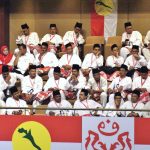KUWAIT has embarked on a sweeping programme of citizenship revocations, affecting tens of thousands of individuals, predominantly women who acquired nationality through marriage.
The move, described by some as a reformist agenda, has drawn sharp criticism and left many in legal limbo.
The policy, spearheaded by Kuwaiti emir Sheikh Meshal al-Ahmad Al-Sabah, who dissolved parliament and suspended parts of the constitution five months after taking power in December 2023, appears to aim at restricting nationality to those with blood ties to the small, oil-rich nation.
Analysts suggest this is an attempt to reshape Kuwaiti identity and potentially reduce the electorate after years of political instability. In a televised address in March, the emir pledged to “deliver Kuwait to its original people clean and free from impurities.”
Unprecedented Scale of Revocations
Official figures tallied by AFP indicate that over 37,000 individuals, including at least 26,000 women, have had their Kuwaiti nationality revoked since August. However, media reports suggest the actual number could be significantly higher.
While large-scale citizenship revocations are not entirely unprecedented in Kuwait, Bader al-Saif, an assistant professor of history at Kuwait University, has stated that “the volume is definitely unprecedented.” Kuwait already hosts a substantial stateless community, known as the Bidoon, estimated at around 100,000 people, who were denied citizenship upon independence from British protection in 1961.
The latest campaign specifically targets naturalisation by marriage, a process that historically applied only to women, and has retroactively revoked citizenship granted to wives since 1987.
Official data reveals that 38,505 women were naturalised by marriage between 1993 and 2020.
The crackdown also extends to individuals holding dual nationality, which Kuwait does not permit, and those believed to have obtained citizenship fraudulently, for instance, through forged documents. Even prominent figures, such as pop singer Nawal The Kuwaiti and actor Dawood Hussain, who had been naturalised for their achievements, have lost their citizenship.
Personal Stories of Disruption
Many of those affected are now facing profound difficulties. Lama, a grandmother in her 50s originally from Jordan, recounted learning that she was no longer a Kuwaiti after her credit card payment was declined and her bank account temporarily frozen. She told reporters that to have been a law-abiding citizen for over 20 years and then to “wake up one day to find out you’re no longer a citizen… that’s not okay at all.” Lama, like others interviewed by AFP, requested anonymity, citing fears of official retaliation.
Businesswoman Amal, who had been a Kuwaiti for nearly two decades, said that she had become “stateless overnight.” Many individuals now find themselves in legal limbo, scrambling to restore their previous nationalities. Mansoureh Mills of Amnesty International highlighted that “the right to nationality is a very basic human right, and failure to respect and ensure it can wreak havoc on people’s lives,1 as… the Bidoon know all too well.”
The Question of Kuwaiti Nationhood
Analysts assert that the current initiative revolves around the fundamental question of Kuwaiti nationhood.
Saif explained that he traced it to “the notion of identity: who are we as a nation?”
While Kuwait’s parliament is a rarity in the monarchical Gulf, its tiered citizenship system limits political rights to those born to a Kuwaiti father.
After Iraq’s invasion in 1990, naturalised Kuwaitis were granted voting rights after 20 years of citizenship, as were children born after their father’s naturalisation.
Saif described this as “a token of appreciation” for standing by Kuwait and a “push for national unity after liberation.”
However, Giorgio Cafiero, CEO of Gulf State Analytics, suggested that Kuwait’s new leadership holds “an exclusionary vision of Kuwaiti nationalism,” intending to keep out “people who lack deep roots there.”
Researcher Melissa Langworthy, who has studied citizenship issues in the Gulf, posited that naturalised women were “being told clearly that they are not the ideal reproducers of the nation.” Lama lamented, “They went after mothers, the heart of the family. We are the mothers and grandmothers of the children of this country.”
Initially presented as a crackdown on fraudsters exploiting Kuwait’s generous benefits, the measure was initially welcomed in a country where complaints of corruption and mismanagement are rife.
However, the public mood quickly shifted. A Kuwaiti man whose wife lost her citizenship said the government was equating “innocent women and fraudsters.” His wife, a retired civil servant, has had her pension suspended for over six months and her bank loan frozen. He questioned, “What kind of message are we conveying by inciting racism and treating them unfairly?”
Authorities have pledged that the affected women will be treated as Kuwaiti and will retain their social benefits, but those caught by the campaign have lost any political rights. The emir cited constant standoffs between lawmakers and the royal-appointed cabinet as his rationale for dissolving parliament, which had long delayed reforms necessary to diversify the oil-reliant economy.
Cafiero suggested that “the Kuwaiti leadership is possibly seeking to reduce the citizen population in order to shape a smaller, more politically manageable electorate.”
-BTS Media


